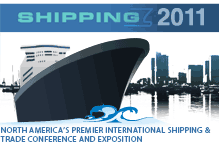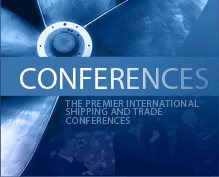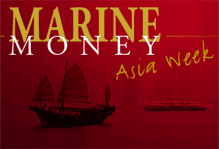
Refinanced
The Singapore office of Watson, Farley and Williams LLP has advised Standard Chartered Bank in relation to a USD 21 million loan facility provided to Contender Marine Ltd. for the purpose of re-financing part of the existing indebtedness of HDG Marine Ltd (the parent company of Contender Marine Ltd) pursuant to a bridging facility advanced by Standard Chartered Bank to HDG Marine Ltd. Continue Reading
FSL Seeks Unit Buy Back Mandate
In an effort to enhance shareholders’ value, the Trustee-Manager of First Ship Lease (“FSL”) is seeking the approval of its unitholders this week to buy back up to 10% of the total number of issued units. FSL says the unit buy-back mandate is a flexible cost effective tool of capital management that can improve the net asset value and mitigate short term market volatility by offsetting the effects of short term speculative trading of the units. Continue Reading
Market Disruption?!
Just as we thought banks’ dollar funding costs have stablised, Rickmers Maritime announced last week that one of its lending banks had invoked the market disruption clause on its loan. The higher interest rate will result in an incremental increase in interest expense of approximately USD 47,000 for this fixing period. The shipping trust assured investors that none of the other nine banks with whom it had secured credit lines has invoked the market disruption clause. For the investors, the distribution per unit should not be immediately impacted considering that the trust has cash accumulated from its policy of retaining a portion of its distribution cash flow. Continue Reading
Swiber Seals Joint Ownership
Singapore based Swiber Holdings (“Swiber”) has demonstrated that with the right asset and out of the box thinking, pockets of liquidity still exist even in the heart of the global financial crisis. On 24 March 2009, US based ICON Capital Corporation (“ICON”) – one of the largest independent, privately held equipment leasing and specialty finance companies in the United States paid Swiber USD 19.125 million for a 51% interest in Victorious LLC, a Marshall Islands incorporated wholly owned subsidiary of Swiber whose sole asset is a 300 men dive support accommodation work barge. R.S. Platou Finans Singapore Pte. Ltd. And LS Finans A.S., Oslo were the advisers to this transaction.
The consideration is calculated based on the unaudited net tangible asset value of Victorious LLC at the time of subscription, being USD 37.5 million. ICON will acquire a senior, controlling equity interest in and all management rights with respect to Victoria while Swiber will provide the barge in exchange for a subordinate non-controlling 49% interest in Victorious. Victorious will also assume USD 5 million of subordinated indebtedness in favour of Swiber that bears interest at the rate of 3.5% per annum. Continue Reading
Let the Stakeholders Speak
During our conference in Hong Kong, the panel titled “Stakeholders Unite: Owners, Investors & Lenders on What Comes Next” generated a lively discussion on the many issues revolving around shipping today including the role of private equity in shipping, China’s increasing dominance in the global supply chain and the funding gap of the global orderbook. We bring you some of the highlights. Continue Reading
Sparks of Life
Over the past few weeks, the sluggish lending and bond markets sprang to life as we begin to see more transactions happening in North Asia. In a deal that could possibly be the largest the world has seen this year, a Chinese bank is rumoured to be in the market financing over 50 Chinese built newbuildings for a Chinese shipping conglomerate. This transaction will certainly spark more discussion on the Chinese policy of supporting domestic shipyards, and its repercussions on the global shipping glut. Continue Reading
The Chinese Establish a Beachhead
On Tuesday, Australia’s Foreign Investment Review Board and Federal Treasurer gave regulatory approval for Hunan Valin Iron and Steel Group Co. (“Valin”) to acquire 260 million new shares in Fortescue Metals Group (“FMG”), at a purchase price of AUD 644.8 million, thereby increasing its holdings to 17.4%. The level of ownership is below the 17.55% limit agreed between the parties. The proceeds will strengthen FMG’s balance sheet as the company consolidates its base 55 million ton per annum infrastructure platform.
Structured so that it would be a model for investment from China, the structure is simpler than the Chinalco investment in Rio Tinto requiring only that the Valin’s representative on the board, Chairman Li Xiaowei, recuse himself from marketing and pricing decisions.
For the moment, the Rio Tinto/Chinalco and Minmetals/Oz Minerals transactions await approval and the world waits to see whether China’s appetite in Australia has been sated and, if so, where it will next spend its cash horde.
The “New” Delphic Oracle
Lately, it is impossible not to be inundated with news of the BDI in whatever business media you listen to or read. Now, even GE sees it as a leading indicator. In an article appearing in Tuesday’s FT, Richard Milne wrote: “GE has started to see the first glimmers of hope in the world economy.” Among the many signs of life, Nani Beccalli, the CEO of GE International, refers to is “…the recent rise in the Baltic dry shipping index, which acts as a proxy for global trade…”
To us, this is rather scary as current data confirms that while BDI was booming we were sinking into the current recession. BDI be damned, let’s head to Delphi.
Gleanings from Capital Link
Following the CMA, Capital Link held its 3rd Annual Invest in International Shipping Forum at the Metropolitan Club, which was overflowing for much of the day. There were general presentations, panels as well as company presentations. The following were our main takeaways from this forum.
The container sector has been the hardest hit and so we listened with great interest to that panel led by Ken Hoexter of Banc of America Securities-Merrill Lynch. The panelists included Gerry Wang of Seaspan, Aristides Pittas of Euroseas and Dimitiri Andritsoyiannis of Danaos. The collapse of the market is attributable to simple supply and demand. Overbuilding joined with reduced demand resulting from a slowdown in consumer buying. Mr. Wang believes this is a 12 to 18 month problem with 2012 to 2014 being good years. The lines will survive as they exercise self-help by utilizing alliances, like the airlines. Slot sharing is not as effective as filling a single ship instead of having two partially filled. Mr. Andritsoyiannis espoused the certainty that globalization will continue and that the containership is the only way to efficiently move finished goods. Mr. Pittas reminded everyone that it is a cyclical business and the good market will return. He plays the market more than his fellow panelists. He operates his smaller ships on shorter-term charters taking advantage of good markets and laying up vessels when the market is bad. He currently has three ships in lay-up and is relying on his solid balance sheet to get his company through the downturn.
FREE at Last
FreeSeas Inc. has joined the rest of its peers in modifying its loan agreements by obtaining waivers from each of its lenders and refinancing a portion of an existing loan facility.
Credit Suisse has agreed to waive the any potential breech of the LTV covenant on its reducing revolving credit facility ($79.3 million) from October 1, 2008 to March 31, 2010. In exchange the company will make a partial prepayment in the amount of $5 million by July 31st.
First Business Bank has agreed to waive any breaches of the same covenant under its term loan ($24 Million) from December 31, 2008 to January 1, 2010.
Finally, Hollandsche Bank – Unie (“HBU”), with $49.6 million in total facilities outstanding, agreed to waive any breaches of the LTV from October 1, 2008 through July 1, 2010. Moreover, they have also agreed to amend the ratio going forward on all its facilities as follows:
• 100% on July 1, 2010
• 110% on July 1, 2011
• 120% on July 1, 2012
• 125% on December 31, 2012
HBU also agreed to refinance a $27.1 million balloon payment due on August 1st on the M/V Maverick replacing it with a 3.5 year facility, which is payable in 13 quarterly installments of $600 thousand with a final balloon of $19.3 million payable on November 1, 2012.
We tip our hat to Mr. Varouxakis who has positioned his company to issue an unqualified opinion, eliminated any risk of default at least from the perspective of the LTV covenant for at least a year and eased its principal repayment schedule. All this for foregoing the payment of dividends which cash will be used instead to pay down debt.







